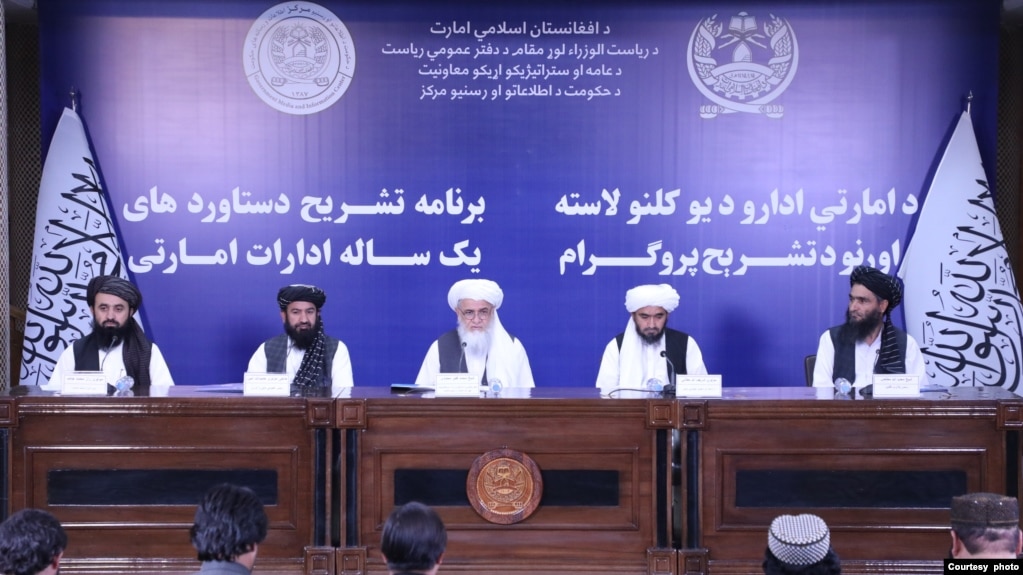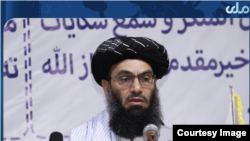Voice of America
August 25, 2024

ISLAMABAD — The United Nations expressed concern Sunday over the enactment of a morality law by Afghanistan’s ruling Taliban that imposes severe restrictions on personal freedom, silences women in public, and requires them to cover their faces.
“It is a distressing vision for Afghanistan’s future, where moral inspectors have discretionary powers to threaten and detain anyone based on broad and sometimes vague lists of infractions,” said Roza Otunbayeva, the head of the U.N. Assistance Mission in Afghanistan.
The Islamist Taliban announced the ratification of their Law on the Promotion of Virtue and the Prevention of Vice Wednesday, forbidding women from singing, reciting poetry, or speaking aloud in public and requiring them to keep their faces and bodies covered at all times.
Taliban’s ‘reforms’ lead to 21,000 musical instruments destroyed in Afghanistan
“It extends the already intolerable restrictions on the rights of Afghan women and girls, with even the sound of a female voice outside the home apparently deemed a moral violation,” Otunbayeva said in the statement released by her office in Kabul.
The promulgation of the 35-article law occurred after the Taliban had prohibited Afghan girls from continuing education beyond the sixth grade and imposed extensive limitations on women’s ability to work in most occupations and participate in public activities.
It empowers the Ministry for the Propagation of Virtue and the Prevention of Vice to enforce these rules across impoverished Afghanistan, ranked as one of the worst humanitarian crises in the world, reeling from years of war and natural disasters.
The ministry can give warnings before imprisoning offenders for durations of one hour to three days, and it also may seize property as a penalty if considered appropriate.
“After decades of war and in the midst of a terrible humanitarian crisis, the Afghan people deserve much better than being threatened or jailed if they happen to be late for prayers, glance at a member of the opposite sex who is not a family member, or possess a photo of a loved one,” Otunbayeva said.
She said the outside world wants Afghanistan to pursue peace and prosperity, ensuring that all its citizens have a stake in their future rather than just being subject to discipline.
“Further restricting the rights of the Afghan people and holding them in constant fear will make achieving this goal even harder,” Otunbayeva said.
The U.N. agency said it was studying the newly ratified law, its implications for Afghans, and its potential impact on the U.N. and other humanitarian assistance. Employment-related Taliban curbs on women also prohibit them from seeking jobs in U.N. agencies and humanitarian groups.
The U.N. mission renewed its call for Afghan authorities to “swiftly reverse the policies and practices” restricting “the enjoyment by women and girls of their human rights and fundamental freedoms.”
Taliban authorities did not immediately respond to the criticism of the morality law.
The head of the Vice and Virtue Ministry has declared the enforcement of Sharia (Islamic law) and hijab regulations for Afghan women as its “red line.”
Taliban-run state broadcaster RTA quoted Mohammad Khaled Hanafi Sunday as urging a meeting of religious scholars to push back strongly against “criticism and propaganda by Western countries” targeting the Sharia implementation in Afghanistan.
“The Islamic Emirate is committed to granting women all their rights under Sharia law. Anyone with a complaint in this regard will be heard, and the issue will be resolved,” Hanafi said, referring to the all-male Kabul government, which is not recognized by any country.
Recent U.N. reports have questioned the ministry’s actions, warning that its ever-expanding policing of public morality contributed to a “climate of fear and intimidation” among Afghans through edicts and the methods used to enforce them.
Media freedom
The morality law has also raised deep concerns among advocates of media freedom. One of its provisions prohibits the broadcasting and publication of images of living beings, as well as content that is believed to violate Sharia or insult Muslims.
The Committee to Protect Journalists said in a Friday statement that the law represents another “appalling blow” to press freedom in Afghanistan, where the morality police have intensified a crackdown on journalists and fundamental human rights over the past three years.
“The Law for the Propagation of Virtue and the Prevention of Vice grants the Taliban’s notorious morality police extensive powers to further restrict Afghanistan’s already decimated media community,” said Beh Lih Yi, the CPJ Asia program coordinator.
The U.N. has repeatedly said sweeping restrictions on Afghan women and girls make it nearly impossible for other countries to recognize the Taliban as the country’s legitimate rulers.
Last week, the Taliban announced they had banned Richard Bennett, the U.N.-appointed special rapporteur on Afghan human rights, from visiting the country. They accused him of “spreading propaganda” by providing “misleading” information about “the ground realities” in Afghanistan.
 Afghanistan Peace Campaign
Afghanistan Peace Campaign